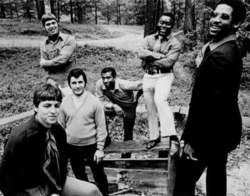The Winstons | |
|---|---|
 The Winstons in 1969 | |
| Background information | |
| Origin | Washington, D.C., U.S. |
| Genres | Funk, soul |
| Labels | Metromedia |
| Past members |
|
The Winstons were an American funk and soul music group based in Washington, D.C. They are known for their 1969 recording featuring a song entitled "Color Him Father" on the A-side, and "Amen, Brother" on the B-side. Halfway into "Amen, Brother", there is a drum solo (performed by Gregory C. Coleman) which would cause the release to become the most widely sampled record in the history of electronic music. [1] Sampled audio clips of the drum solo became known as the Amen break, which has been used in thousands of tracks in many musical genres, including breakcore, drum and bass, hip hop, [2] jungle, big beat and industrial. [3]
Contents
The "Color Him Father" record sold over one million copies, and received a gold record awarded by the Recording Industry Association of America on 24 July 1969. It also won a Grammy Award for the Best Rhythm and Blues Song (1970). [4]
The Winstons struggled to secure gigs in the South with their multiracial composition and disbanded in 1970. [1]